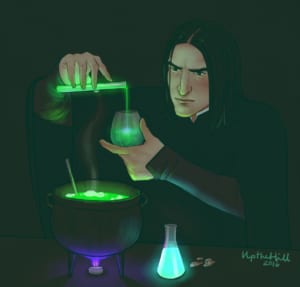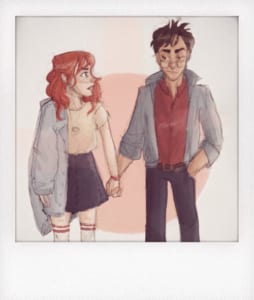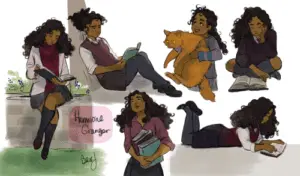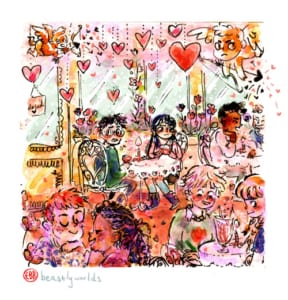Presented by “Harry Potter and the Reread Project”
At the end of my last reread post, we left Harry and his friends to spend Christmas at Number 12, Grimmauld Place after Harry had witnessed Arthur Weasley being attacked by Nagini, assuming he was being possessed by Voldemort and isolating himself from all of his friends because of that until Ginny set him straight. When Harry returns to Hogwarts after Christmas, he has to not only deal with his feelings for Cho Chang, but also another Azkaban outbreak and Rita Skeeter, the fallout of Dumbledore’s Army being discovered, a deeply upsetting discovery about his father, and the fact that Hagrid has brought his half-brother, an actual giant, to live in the Forbidden Forest. And all of this is happening on top of exams that will decide Harry’s future career. So not at all stressful or intense.
An important Skill and a terrible Teacher
Of course, before Harry actually gets to return to Hogwarts, he finds out something that absolutely ruins his excitement to get back to school: He will have to attend one-on-one Occlumency lessons with his least favourite teacher, Severus Snape.
As anyone who has followed the reread series so far knows, I am far from a fan of the potions professor. I’ve laid out my reasons for that a couple times, but the main ones are that he is intensely abusive towards some his students for no other reason than personal dislike and that he essentially ruined Remus Lupin’s life out of pettiness by outing him as a werewolf at the end of Prisoner of Azkaban, as well as the fact that he, you know, willingly joined the equivalent of a Neonazi hate group.
However, a fantastic piece by my colleague Barbara has made me rethink my position on Snape. As she points out, Snape was most likely emotionally and verbally abused by his father during childhood, as well as poor and lonely, and then the main target of the Marauder’s bullying at school. The only friends he had were a clique of would-be Death Eaters at school – and even they weren’t really friends – and Lily Evans, a friendship that is severly tested by Snape’s friendship with aforementioned Death Eaters and that ultimately falls apart after Snape fucks up royally, and says one of worst possible things you can say to anyone, to Lily. So it’s not exactly surprising that after that, an emotionally stunted, angry, isolated teen became a Death Eater.
More importantly, as she pointed out, Snape did something deeply heroic to make up for his allegiance to Voldemort: he turned on one of the most powerful wizards in history to spy on him. Yes, his motivation was not that he had seen that committing genocide is morally wrong but the fact that the life of the only person he ever genuinely cared about was threatened, which leaves a bit of a stain on his decision. But ultimately, Snape becoming a spy for Dumbledore still meant that he continously risked his life to defeat Voldemort and his supporters and he continued to do so even after Lily’s death, with the aim to protect Harry. So while Snape is still an abusive asshole – as his interactions with his students prove – he’s also not a terrible person that I deeply loathe.
Or that’s how I felt until I arrived at the penultimate part of Order of the Phoenix. As mentioned already, Harry has to start attending Occlumency lessons with Snape. Now, we all know that Snape is, to put it bluntly, an absolutely horrid teacher in general. But the Occlumency lessons he gives Harry are a whole new level of horribleness.

The thing is, calling what Snape does “Occlumency lessons” feels like an insult to every actual teacher who has attempted to teach someone something. It seems a lot more like Snape is doing what Sirius suspected he would: use the lessons to give Harry a hard time. And by that I mean verbally and psychologically abuse Harry.
From the very beginning, Snape is just incredibly cruel to Harry. For example, despite admitting that both Occlumency and Legilimency are obscure branches of magic that most people don’t usually come into contact with, he decides to insult Harry for not knowing what it is and asking follow-up questions. He also offers absolutely no guidance or advice on how Harry might actually keep Snape out of his thoughts, he just tells Harry over and over to let go of his emotions, often while simultaneously riling him up through further insults and taunts.
Additionally, Snape’s Occlumency lessons are dragging up memories of Harry’s childhood abuse at the hands of the Dursleys, including memories Harry didn’t actually know he had. Now, it’s not clear if Snape does this on purpose or not because it’s not clear how much control he actually has over what he sees in Harry’s mind. But I’m not sure if it really matters, considering that even if Snape isn’t seeking out these kind of memories, he still uses them to taunt Harry on at least one occasion.
In my opinion, it’s hard to read these scenes and not hate Snape. For one, JKR is very good at making the readers sympathize with her characters and take their point of view simply because she is very good at describing their internal lives richly and realistically. Harry’s anger and annoyance feels real and justified, making it hard for readers not to take his side.
In addition to that, Snape’s behavior is just wrong. Apart from the fact that it’s generally morally wrong to make someone else suffer, it’s hurting the cause Snape is actively risking his life for. Multiple characters – including Snape himself – point out how crucial it is that Harry learns Occlumency. It’s literally a life or death situation. And Snape still doesn’t put his hatred of Harry aside long enough to actually teach him.
Of course Dumbledore could and should have made sure that Snape did this vital task he assigned him properly, especially since he knew how little Snape liked Harry, but ultimately Snape is still an adult man. Yes, a deeply emotionally stunted one who should visit a therapist as soon as possible, but none of that changes the fact that he is still responsible for his own actions. The fact that he cannot even put aside his unjustified hatred of Harry and not abuse him when the future of the fight against Voldemort is on the line is entirely on him and no one else.
Sympathy for the Devil
At the same time, while JKR gave us some of Snape’s most hateful actions during this part of Order of the Phoenix, she also gave us one of the scenes that probably rightly garnered him most of the readers’ sympathy. I am speaking, of course, of “Snape’s Worst Memory”.
To be honest, I really wasn’t keen on rereading this chapter. I’ve never made it a secret that I’m quite attached to Remus and Sirius as adults and I used to be quite fond of the teenage Marauders, too, despite – or maybe because of – the fact that we are told so very little about them. So obviously rereading a chapter where they do something truly terrible (and were I have to confront my own biases about them) was not something I looked forward to.
Additionally, the whole chapter is pretty cringe-worthy from almost the very beginning. I essentially wanted to yell at Harry to just walk away, to not touch the Pensieve, to just turn around and leave Snape’s office while Snape isn’t there but of course that wouldn’t have made a difference. And from the moment Harry lands in Snape’s memories, it doesn’t get better.
James and Sirius are far from sympathetic. They’re very much the kind of stereotypical, popular jock students: arrogant, overly passionate while still trying to seem cool and relaxed, always feeling the need to be the center of attention and incapable of handling boredom. They’re essentially typical careless teenage boys.
At the same time, I weirdly enough do find myself liking them a bit. I can’t really explain it – I feel like it’s a combination of knowing that they are deeply loyal people with strongly held moral convictions and knowing what the pretty horrible fate that they’ll suffer through.

I’m not going to pretend that James and Sirius – and to a lesser degree, Remus and Peter – weren’t also petty bullies because that’s what they were, especially towards Snape. But at the same time, they did something illegal and dangerous solely to help a suffering friend that other people would have probably abandoned and got involved in a deadly war against the equivalent of a fascist organization because they hated dark magic.
I am aware that this next bit is going to sound a bit horrible, but the thing is, I can even kind of understand why James and Sirius hated Snape as much as they did. And I am saying that as someone who was definitely an outsider in school, with whom no one ever wanted to do group projects, who for the majority of their teenage years had few actual friends and who was constantly talked about and mocked behind her back and occasionally to her face.
But Snape is essentially the annoying kid that has from the first moment they’ve met expressed sympathy for the dark arts – by saying that Slytherin is the best house – and disdain for Muggles, that stalks the Marauders to get them expelled and that hangs out with the local neonazis. I do find it understandable that they hated his guts. But that does not justify the way they bullied him all throughout their teenage years or make it understandable, just as it does not justify what they did to him after their Defense Against the Dark Arts OWL exam. While Sirius and James hating Snape is understandable and doesn’t make them horrible people, the way they treated him does.
On the other hand, it is impossible to not also feel sympathy or pity for the teenager Snape, especially in this scene. He is doing literally nothing wrong, he’s just minding his business after the exam, and Sirius and James still attack him for no other reason than their own boredom and massively abuse and humiliate him in front of a large portion of his classmates, who all laugh at him. Additionally, out of this humiliation springs anger that causes him to lash out at the only person he cares about and that cares about him in an absolutely unforgivable way, costing him Lily’s friendship.
Interestingly enough, JKR manages to almost immediately also undermine that sympathy for Snape a little by how massively she makes him attack Harry. He grabs Harry so strongly that it leaves a bruise on his arm, shoves him to the ground and throws something at him. Obviously Harry should not have been in Snape’s memories in the first place, obviously all of it is deeply upsetting to Snape and obviously Snape’s anger at Harry for that is justified, but the way he physically attacks Harry, cancels the Occlumency lessons despite knowing how absolutely vital they are, and later on destroys one of the potion vials Harry hands in to be graded isn’t; in my opinion.
It’s obvious that Snape is triggered by finding Harry in his memories and having to revisit that specific memory. He is “white with rage”, his “lips were shaking, his face was white, his teeth were bared”. But the thing is, even when you are triggered and angry and generally in a bad mental or emotional state, it doesn’t suddenly become okay or forgiveable to physically hurt and take your anger out on another person, even if they caused your anger, and you still need to apologise and make amends for that. Snape essentially physically abuses Harry, after months of emotionally abusing him, and the circumstances in which it happens doesn’t change the fact that it’s morally wrong.
The Trouble lies in the Execution
This, in my opinion, is one of JKR’s biggest strengths and one of the things that makes the Harry Potter series as compelling as it it. She creates well written, multifaceted characters who are neither entirely good nor entirely evil and who readers can both like and hate, sometimes at the same time. Her characters show that people are not determined by their individual actions, that it’s possible to be a good person who does horrible things and a horrible person who does good things. Snape is the most obvious example for this, closely followed by Dumbledore, who I will write about more in-depth in my next piece, but I think it’s also true of James and Sirius.
At the same time, while the idea is admirable and important, JKR doesn’t execute it as well with certain characters as she does with others. The best example for that is probably James: we only ever actually get to see him in this one scene in Order of the Phoenix where he acts like an utter dick. Apart from that, almost everything admirable we learn about him is second hand and very much a case of telling rather than showing. The same is true of his character developing: we are told that he deflated his head and essentially stopped bullying most people, but again, we are never really shown anything that proves that. Of course that doesn’t make it less canon, it just means it not as well executed as it is in other cases.

Another case where it’s equally glaring is the relationship between James and Lily. Essentially, over the course of seven books, the readers get two scenes where they are actually present: one is the scene besides the Great Lake in which Lily calls James “an arrogant, bullying toerag” for good reasons, the other is Voldemort’s memory of their murder. We never really get to see how they got from one point to the other and even the explanation that Sirius and Remus give Harry is unsatisfactory. One the one hand, that has opened up a lot of space for insanely good fanfiction but on the other hand, I find it a pretty big flaw within a piece of fiction if it leaves such big holes.
Obviously an author can hardly work out and portray all details and facets of a their universe and the characters they created, but when such important details are left out, or only hinted at, or barely and unconvincingly explained, it’s frustrating for me as a reader because it’s hard to believe.
A Vindictive Know-It-All
There’s another character, in my opinion, that shows how many people are neither all good nor all evil: Hermione Granger. She’s definitely someone with good ideas and intentions who is primarily trying to make the world a better place and support her friends. That’s why she is so outraged by the enslavement of house elves, why she pushes Harry into founding Dumbledore’s Army and why she organises the interview with Rita Skeeter that is published in the Quibbler.
But Hermione’s good intentions make her cross the line more than once. She ignores that the house elves have no interest in freedom and her campaign for it, so she starts knitting clothes to trick them into obtaining their freedom. And she never even bothers to check what kind of effect this has on them.
An even better example than that is how Hermione punishes Marietta for telling Umbridge about the DA. While it’s immoral not to tell the DA members that the parchment they signed is hexed to punish them for betraying the DA, it ultimately makes sense: if people had known, they could have simply refused to sign and still ratted out the DA or tried to find another way around it. But permanently disfiguring someone is even more immoral, especially because it’s not especially effective, as Mims Dahn pointed out in the comments to my previous piece – while it does mark the person who betrayed the DA and prevents them from becoming a spy, it doesn’t immediately alert the DA to the fact that they were betrayed and it doesn’t prevent them from being betrayed.
I‘ve written in the past about how JKR doesn’t frame Hermione’s behaviour as wrong but rereading Order of the Phoenix made me question whether that’s really true. She shows that Hermione’s attempts to liberate the house elves lead to Dobby having to clean the Gryffindor Common Room all by himself because all of the other house elves refuse to go there because of Hermione’s knitted clothes. She also has Cho call Hermione jinxing the parchment “a horrible trick”. The problem is that JKR writes Hermione herself as never realizing how her behaviour is hurtful or damaging to others and making amends for it. And in the later case, there’s a clear undertone of Marietta having deserved the disfigurement because she betrayed the DA and is thus a horrible person.

The same is true of Rita Skeeter. In Goblet of Fire, Hermione, who has suffered a fair bit due to Rita writing a nasty article about her, discovers that Rita is an unregistered animagus, catches her, imprisons her for about a week and then blackmails her. This is also how Hermione forces Rita into doing an interview with Harry for the Quibbler after multiple Death Eaters break out of Azkaban. Blackmailing someone is obviously morally wrong but Rita is a genuinely cruel, mean and selfish person. Again, there’s an undertone of “she deserves it”. But when it comes to Hermione’s treatment of Rita, I am far more inclined to agree than in the case of Marietta.
What I realized during my reread of Order of the Phoenix specifically was also just how much I love and admire Hermione. Some of her finest moments take place in that book, like her telling of Harry for taking his justified anger about his genuinely shitty situation out on her, her seeing through Umbridge’s speech at the start of term feast, her repeatedly standing up to her in class and her pushing for the founding of the DA.
She has some very serious flaws, of course: Hermione’s self-righteous, vindictive, and so consistently logical that it borders on seriously unemotional and unempathetic. But she’s also smart, loyal, brave, caring, and fundamentally moral. She’s not to be cowered or intimidated by authority or adversity.
This is especially important to me because I can’t think of any other female character quite like this, especially not in children’s literature and especially not in the 90s. Harry Potter was generally massively formative for many millenials, including me, and Hermione was an especially influential character. I grew up with her, I idolised her as a child and teenager, and I probably wouldn’t be the way I am right now if it hadn’t been for her. Despite all of her character flaws, I can’t help but still love her.
Frustrating First Dates
However, there’s another thing that caused me quite a bit of frustration, namely the relationship between Harry and Cho, and especially their first and last date. Describing it as really bad almost feels like sugarcoating it – it’s just an absolute disaster .
In case you don’t remember, here’s what happens: After she kissed him, Harry asks Cho out to Hogsmeade on Valentine’s Day in the most awkward way possible – he doesn’t realize that she’s trying to ask him out, essentially snubs her and only then realizes what he has just done, so he runs after her and asks her to go to Hogsmeade together. They meet and walk down to Hogsmeade together in awkward silence only interrupted by a conversation about Quidditch before they lapse into awkward silence again. After an equally as awkward wander around the Hogsmeade shops, they decide to have coffee at Madame Puddifoot’s, a quaint little teashop where gold cherubs are throwing

confetti and multiple other Hogwarts couples are on dates as well. When they sit down, Harry remains silent and uncomfortable, looking everywhere but at Cho because he’s only just realized that she might want to hold his hand. Despite Cho managing to restart the conversation by mentioning Umbridge, Harry steers the conversation of another cliff by telling Cho that she’s welcome to come to the Three Broomsticks with him where he’s meeting Hermione for lunch. Cho, who’s probably hurt and confused because the boy she’s on a date with remains silent and unaffectionate, avoids looking at her and just brought up that he agreed to meet another girl immediately, essentially cutting their date short, tries to make Harry jealous by mentioning that another boy asked her out. When Harry doesn’t react, Cho asks Harry about Cedric, something she admits she has meant to ask for ages and that probably took her quite a bit of courage to bring up. Harry answers her truthfully but immediately tries to switch the topic. When Cho makes it clear through tears that she needs to talk about the fact that her boyfriend was murdered and asks Harry if he doesn’t also need to talk about it, Harry explains that he has talked to Ron and Hermione about it. Cho reacts with hurt and jealousy which makes Harry laugh out loud with relief because he hadn’t realized that she was jealous – the worst possible reaction. Cho, even more hurt because her date just laughed at her while she was crying her eyes out, springs up and storms out. Like I said, it’s a disaster.
A large part of why the date went as horrible as it did is, in my opinion, due to Harry’s emotional immaturity. He has no idea what he’s doing, what is expected of him or how to even talk to Cho. Because of that, he behaves in a way that must seem cold, standoffish and even uninterested in her to her, especially when he mentions that he’s meeting up with someone else directly afterwards and that she can come along if she wants, something that does sound quite a bit like he’s trying to get rid of her. Of course Cho is hurt and confused.
Annoyingly enough, JKR frames it as if it’s partially Cho’s fault that the date went as badly as it did. When Harry tells Hermione about it, Hermione explains why Cho acted the way she did and points out Harry’s lack of tact. However, when Harry says Cho should have just asked him if he liked her more than Hermione, Hermione agrees but points out that girls rarely ask such questions because they don’t act sensibly. JKR frames it as if the reason Harry’s date with Cho went badly was that Cho is an overemotional, unreasonable girl rather than because Harry treated her without tact and empathy. It’s quite misogynistic, actually.
Unfortunately, it gets even worse. When Cho realizes that Harry gave an interview about Voldemort’s return to the Quibbler on Valentine’s Day, she comes and apologizes to him. Despite them being back on speaking terms again, Harry makes no effort to make up for his lack of tact. Shortly after, their relationship falls apart entirely: Cho tries to apologize and explain after her friend has ratted the DA out to Umbridge and gotten Harry into trouble. Harry reacts moodily, internally blames Cho for not choosing her friends better and then yells at Cho for pointing out that Hermione jinxing Marietta was actually pretty horrible. And that’s essentially the end of their relationship.
Cho really gets the short end of the stick in her relationship with Harry and the portrayal of it. She’s a clever, empathetic, caring, and loyal person who genuinely likes Harry. Even when she is crying and feeling confused, she tries to get Harry to talk about his trauma out of a genuine understanding. But instead she’s framed as being overly emotional, irrationally jealous, and not loyal enough to Harry and the fight against Voldemort.
Let’s also not ignore that Cho is the only Asian character who plays a bigger role in the entire series but fulfills many of the damaging stereotypes about Asian woman as fragile and sad and eternally crying about white men who love but abandon them, as Rachel Rostad points out in her amazing slam poem “To JK Rowling, From Cho Chang”. This is something where JKR could and should have done a lot better.
A King with Self-Confidence Issues
Where she does do well is developing Ron further. In Goblet of Fire, Ron’s inferiority complex finally comes out in full force when Harry becomes a Hogwarts Champion, making Ron feel betrayed and left out. Although Ron gets over his anger at Harry and realizes that he was wrong, his lack of self-confidence remains an issue that is barely touched upon.
In Order of the Phoenix, Ron then becomes the Keeper of the Gryffindor Quidditch team as well as a Prefect. The later not only gives him responsibilities – which he is not overly enthusiastic about – but also shows him that authority figures think he is capable, and puts him in a spotlight that has nothing to do with Harry. However, it’s his role as Keeper that has more weight within the plot of the book.
Ron is far from a good Keeper. He doesn’t lack the skills, though – it’s his confidence. Every time he realizes someone is paying attention to him, his performance becomes awful, something Draco Malfoy and the other Slytherins weaponize against him by making up a terrible song that they sing during every Quidditch game.
It’s fitting, of course, that someone who struggles with feeling not good enough does worse when others pay attention to him. It’s also a character trait that doesn’t work in favor of someone playing Quidditch. But JKR manages to make it all work out for Ron – and the Gryffindors – by making it impossible for Ron to quit the team after Harry and his brothers have been banned and then making the Gryffindor Qudditich team lose so badly that Ron can tell himself that his performance doesn’t matter. And because it doesn’t matter, Ron can get over his stage fright and actually do quite well, winning Gryffindor the Quidditch cup and giving his self-confidence some positive fodder for a change.
Turning up the Heat
Another thing JKR does well is gradually make the circumstances both at Hogwarts and outside worse and worse, subtly leading up to the great showdown, first between Umbridge and Harry and then at the Ministry. It’s an organic and logical escalation of the conflict: shortly after Harry comes back to Hogwarts, multiple very dangerous Death Eaters escape Azkaban, which gives Hermione the idea to set up an interview between Harry and Rita Skeeter about Voldemort’s return that is published in the Quibbler, convincing a bunch of people in and outside of Hogwarts that Harry is not lying after all. This spurs Umbridge into demonstrating her power by kicking Sybill Trelawney out of Hogwarts. When she gets shown up by Dumbledore, who insists on keeping Trelawney a Hogwarts resident and hires a centaur as replacement Divination teacher, she escalates her attempts to catch the DA and expel Harry from Hogwarts, which leads to Dumbledore taking the fall and leaving the school, further cementing Umbridge’s position of power. Umbridge escalates her bullying of students and teachers she knows are sympathetic to Dumbledore while Fred and George escalate their prank campaign, that ultimately ends with them fleeing the school.
At the same time, Harry finally recognizes the dark corridor and door that he has been dreaming about for almost the entire book as leading to the Department of Mysteries at the Ministry of Magic. His dreams become more intense, leading him deeper and deeper into it. Simultaneously, he, Ron and Hermione put some more puzzle pieces together: they realize that someone from the Department was murdered with a Devil’s Snare and that an Order member was put under an Imperius curse to try and break in, leading them to conclude that the weapon they have been told Voldemort wants is in there.
Order of the Phoenix is ultimately a very different book from the first four books of the series. Philosopher’s Stone, Chamber of Secrets and Prisoner of Azkaban were most like detective/mystery stories, with the trio trying to solve one specific mystery and clues placed throughout the books, culminating in the solution of the mystery that was often also tied to a fight. Goblet of Fire switched to a more episodic story telling, with the three tasks of the Triwizard Tournaments as points of high conflict. While the mystery of how Harry’s name got into the Goblet and hints that Voldemort was coming back were there, this was not the main focus of the trio. Order of the Phoenix sort of goes back to the mystery story format of the first three books by making Harry and his friends try to figure out what Voldemort is planning but the mystery is sort of overshadowed by the conflict with Umbridge and the Ministry which becomes the main focus for large parts of the book.
However, with Harry’s dreams about the Ministry becoming more and more intense (and only so many pages of the book left), it’s clear that the conflict with Voldemort will soon be brought to its climax.
Join me next time!

